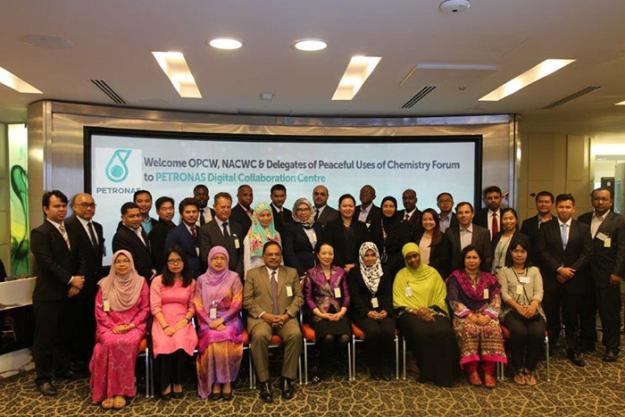
Participants at Forum on the Peaceful Uses of Chemistry: Developing a Chemical Cradle-To-Grave Responsibility Culture held in Kuala Lumpur, Malaysia from 18-20 September.
THE HAGUE, Netherlands –29 September 2017–The Organisation for the Prohibition of Chemical Weapons (OPCW) in collaboration with the Malaysian National Authority for Chemical Weapons Convention (CWC) organised a Forum on the Peaceful Uses of Chemistry: Developing a Chemical Cradle-To-Grave Responsibility Culture in Kuala Lumpur, Malaysia from 18-20 September.
In a bid to build capacity on integrated chemical management and develop a responsibility culture among stakeholders, professionals including chemists, chemical engineers, and other experts from government, industry and academia shared their experiences and best practices in the implementation of the CWC through integrated chemicals management from procurement to disposal. The forum also discussed the roles and responsibilities among the stakeholders in facilitating and monitoring chemical trades in their respective countries.
The Chairman of Malaysian National Authority for Chemical Weapons Convention, H.E. Dato’ Ilankovan Kolandavelu underlined that, ‘’the world faces an emerging threat of chemical weapons falling into the hands of non-State actors and terrorist groups, therefore there is a need to address these threats by enhancing the stakeholders’ awareness and capacity on implementation of integrated chemicals management ”.
OPCW’s Head of International Cooperation Branch, Mrs Xiaohui Wu, highlighted the importance of bringing together policy, industry development, science and engineering to enhance a responsibility culture to ensure the peaceful uses of chemistry.
The programme included panel discussions on a wide range of topics including the implementation of the CWC, international cooperation on integrated chemicals management, relevant treaty implementation challenges and trends in chemical trade for peaceful uses, as well as lessons learned and best practices of chemical management in chemical lifecycle from procurement to disposal.
The participants also paid a visit to PETRONAS Corporate Office and Westport Malaysia Sdn Bhd to witness the practical application of integrated chemicals management from the perspectives of chemical industry and port authority.
The programme welcomed more than 30 participants from Algeria, Bangladesh, DR Congo, Italy, Malaysia, Mauritius, Myanmar, Nigeria, Philippines, Qatar, Seychelles, South Africa, Sudan and Vietnam.
Background
As the implementing body for the Chemical Weapons Convention, the OPCW oversees the global endeavour to permanently eliminate chemical weapons. Since the Convention’s entry into force in 1997 – with its 192 States Parties – it is the most successful disarmament treaty eliminating an entire class of weapons of mass destruction.
Ninety-six per cent of all chemical weapon stockpiles declared by possessor States Parties have been destroyed under OPCW verification. For its extensive efforts in eliminating chemical weapons, the OPCW received the 2013 Nobel Prize for Peace.
